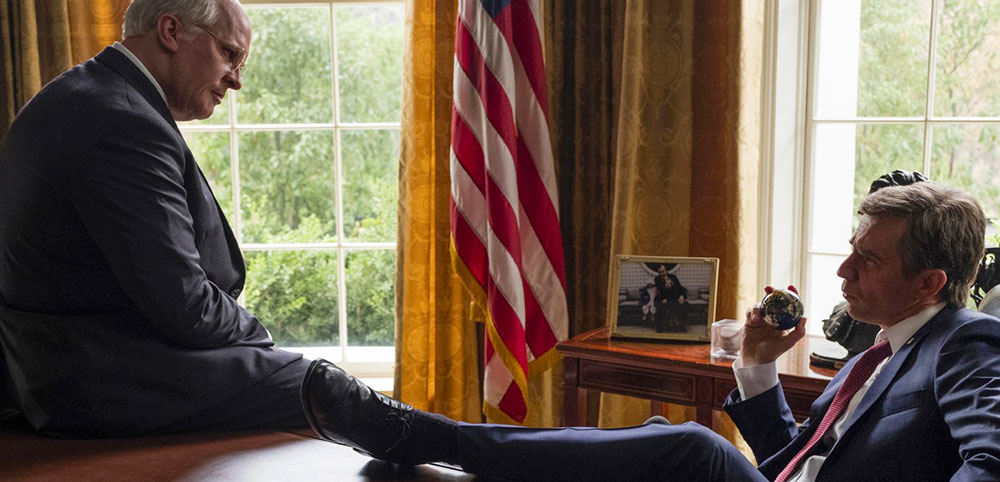Bush True
VICE
Film. Behind the story of Dick Chenney, vice-president of George W. Bush, Adam McKay’s movie is a damp squib thrown at Trump’s America. With 8 nominations for the Oscars, he already won its bet. But this Manichean and showy movie only preaches to the choir.
By Michael Patin

Casper, Wyoming, 1963. The young Dick Chenney, who has just failed his exams in Yale University, is arrested for drunk driving. Babbling, covered with vomit, he has every characteristic of the fatty redneck. Flash forward: On September 11 2001, in Washington’s crisis centre, the same Dick gives orders without caring about the protocol. The program of the movie is comprehended in this leap between two time periods, which also links the meanings of its title: Vice like the vice of the man without quality (alcoholic, scrapper, mediocre, opportunist), and Vice like Vice-president, this glorious function from which he turned away to become the great puppeteer of Bush administration.
”Indirectly, Trump and his supports are obviously the targets of Hollywood
One understands that Adam McKay is less interested in Chenney’s dramatic dimension or his contradictions (his role of loving father being an exaggerated exception) than in his role of symbol of a political class whose cynicism, carelessness and inhumanity have corrupted America. Indirectly, Trump and his supports are obviously the targets of Hollywood- a budget of $60M, a 4 stars casting (Christian Bale, Amy Adams, Steve Carell, Sam Rockwell) and 8 nominations for the Oscars. Problem: this killing game, as joyful as it might sound, turns out to be as shallow and showy as what he wants to denounce.
It’s not Adam McKay’s taste for extreme satire which is problematic. During the first part of his career, he established himself as the undisputed master of the American awkward comedy. With Anchorman: The legend of Ron Burgundy, Talladega Nights: The Ballad of Ricky Bobby and Step Brothers, he didn’t not only provide Wil Ferrell with excessive parts: he reveals the unsaid things of
a nation convinced to be the centre of the universe. The one of constant show and savage capitalism, cars and fast foods, misogyny and patriotism, excess and crudeness. Step Brothers definitely expressed that: the average American is literally depicted as a retarded child. Converting to a more traditional cinema, McKay certainly acquired a certain respectability he couldn’t have otherwise. The critique and public success of The big Short (Oscar of the best scenario in 2016) about the subprime crisis revealed the critique author to be less disruptive. As if the realism has finally made his speech audible and acceptable. Certainly a rewarding domestication, but still a domestication. We never laughed watching The Big Short, no more than we found new arguments against the bank system; we just nodded in agreement, already convinced by the demonstration from the very beginning.
From schoolboy comedy to mean comedy
The great news is that we laugh again watching Vice, or at least we are tempted to do so. McKay seems obsessed with what he might lose becoming a “serious” moviemaker, hence the multiplication of several scabrous details (a black fly landing on Bale/Chenney’s face, Bush/Rockwell stuffing himself with chicken drumsticks, the repetitive heart attacks shown like piddling events). These details are meant to turn the characters into clowns, as pathetic and bigger than life than Ron Burgundy and Ricky Bobby. This committed position, perfectly working in his comedies, here collides with another imperative he seems obsessed with, his desire not to cheat with facts and chronology. The sympathy we felt for his most indefensible heroes, thanks to the excuse of comical fiction, is no longer working: it’s now about bringing these bastards down, pointing an accusing finger at them, mocking them. The scene in which Donald Rumsfeld (Carell) bursts out laughing madly when Chenney, still innocent, asks him in what his camp is supposed to believe, is the typical example: the gag is not working because we are focused on its purpose (mocking the Republicans’ cynicism). Likewise, Bale’s theatrical make-up and his cartoon-like facial expressions refer more to the Manichaeism of the Muppet shows than to the multiple degrees of stupidity and nastiness of Step Brothers.
In turning irony into the driving force of a diatribe that goes far beyond Chenney’s character (everything is a target, from Guantanamo to Fox News), Adam McKay erases every form of contradiction. As if his wink at the audience was enough to forgive his methods of manipulation: war shots edited out of context, mix of real and reconstituted records, significant focus,… Until the presence of a narrator named Kurt, embodiment of the hard-working classes crushed by the powerful ones, who will be victim of a bloody twist. Even Michael Moore, whose vengeful shadow hovers over the movie, has never gone this far in the emphasis. In fact, the biggest reproach one can make to McKay is to fight with the same weapons as his enemies, all those unscrupulous journalists and skilled politicians. Here as well, the shocking picture acts like a proof, the speech’s “little sentence” and the gimmick of style. It’s both the stated principle and the sign of weakness of Vice, aware he’s preaching to the choir, until the post-credits when the members of a “focus group” are talking about its “too liberal” dimension, before fighting with each other… The choice is simple: we like it or leave it. Not liking it is being part of the bad ones. Applauding is the promise of a reduced purchase (of a cinema ticket). One will argue that such a movie is necessary. We only wished it was good.


